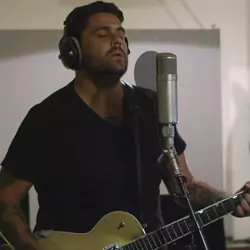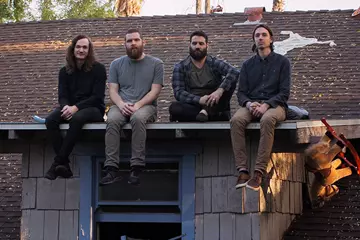 Dan Sultan
Dan SultanDan Sultan is already seated at a corner table when this scribe enters a cosy cafe in an inner city Melbourne suburb that has been chosen for our chat. Sultan's just about to head up to Byron Bay for Splendour In The Grass where he'll perform some tracks from his Killer new album, with a full band. "We've actually got our first show at Splendour, seven o'clock Saturday night," he enthuses. "It's exciting and we did a big production rehearsal yesterday, and went through the set, and it's feeling really good."
You will already have heard Killer's first couple of singles - Magnetic and Hold It Together - and now Kingdom, another taste from Sultan's new album, is doing the rounds on radio. "I'm really proud of it," Sultan says of Kingdom. "We'd written that [song] and then Pip [Norman], about a week later, said, 'I've written another bit for it,' and he sent it through... I was like, 'Holy shit!'" Sultan recounts. "And it felt good before, but then after hearing it with the new bit in it that he just sort of demoed up throughout the track that we'd already done as a demo, I mean, it's just - I can't remember what it was like before."
Kingdom is a song about "getting better", Sultan enlightens. "I think generally people are good, and people know the difference between right and wrong, but I think people can show apathy and complacency, and I think people can be lazy. And at the end of the day regardless of your opinion or your political persuasion - sexual persuasion or anything - I mean, people know the difference between right and wrong, you know? And it's as simple as that. People might be confused, but at the same time they know the difference and it's not a matter of opinion; if two people love each other then let 'em do whatever they want, you know, who gives a shit? For people to feel like other people's freedom is taking away from theirs is ridiculous, and it's self-centred and it's arrogant, you know?
"I don't consider myself political or preachy. I'm opinionated and I speak up when I feel like it but, yeah! Look, that's what it means to me. You put out a song, I mean, it means something different to everybody and it's not for me to say that they're right or wrong. Kingdom I've had people ask me if I'm Christian, you know? 'Cause that's what they get out of it, which [is] all good - I'm not gonna say that they're right or wrong or anything. I mean, you put a song out there - it's never belonged to me in the first place, I'm only the guy that sang it for the first time, you know? That's the way I look at it... people's emotions towards a song belong to them and their understanding about the song belongs to them, but the song itself - it's its own thing, you know?"
Don't miss a beat with our FREE daily newsletter
Sultan finds collaborating "exciting". "You can come in with an idea and bounce it off someone, or a couple of people, and all of a sudden it just kinda blows up, you know, to a place you haven't thought of before."
When asked who he collaborated with on Killer, Sultan tells, "I worked with Alex Burnett again, who's a really good mate and we've done a lot of great stuff together, and Pip Norman - and again we worked together on Blackbird and we worked a lot together on this - and obviously Jan [Skubizewski] again. So they're the kinda three big collaborators." In terms of collaborators he worked with for the first time on Killer, Sultan enlightens, "Jon Hume I worked with, who's great, and he had a great studio in country Victoria. And that's now Jan's studio, Jan's taken over that place with his young family."
Sultan also worked with Julian Hamilton (The Presets) in Sydney on a track called Cul-De-Sac. "We didn't know each other beforehand," Sultan explains of Hamilton. "It's just one of those things that came up and it was great, Julian was great. I mean, I am a fan, you know, and he was a pleasure to work with." After revealing that Cul-De-Sac was the first track he wrote that made it onto Killer, Sultan continues, "I'd written a lotta songs previously, and I wrote a lot afterwards as well; there were about 50 songs all up. But that song was the first one that really - I mean, the record sort of showed itself, if you know what I mean? And then from there, after that, I was writing with that sort of vibe and that sort of energy in mind and in heart, you know? And so, yeah! You know, you're writing and you're writing and you think, 'Well, what is it? What's it gonna be?' And then something like [Cul-De-Sac] comes along and you go, 'Oh, okay!' It helps to provide a bit more clarity to the situation."
Sultan stresses, "the song's the boss, there's no ego" when it comes to co-writes. "We're not gonna use my bit just because I came up with it, I mean, we're just gonna use whatever's the best... the song lets you know what it wants to do and where it wants to go."
When asked whether he usually composes on guitar or piano, Sultan shares, "I write in my head. I have an idea pretty solidly in my head before I sit at an instrument. The instrument's sort of secondary."
The album opener, Drover, is a song written about the Wave Hill walk-off in 1966, written from the perspective of an Indigenous drover. This protest by pastoral workers in the Northern Territory over poor working conditions was immortalised in From Little Things Big Things Grow and Sultan describes his own song as a type of prequel to the Paul Kelly classic. On what made him decide to write the song from the drover's perspective, Sultan offers, "It just happened, you know. I'm a bit of a hippy like that. The songs sort of present themselves and if you're lucky you're listening when they do. I mean, I'm sure I've missed a lot more than I've been able to grab but, yeah!... It's like mathematics, mathematics existed before people had the capacity to understand it, you know? So I sorta see it in a similar way to that without getting too cosmic," he chuckles.
On whether he feels a stronger connection to material that's written based on his own personal experience, Sultan ponders, "I mean, a part of the performance is having that empathy, you know, and going there, and I know, for me, there wouldn't be much point in doing it if I didn't feel that connection. So I don't feel any more connected to the fiction or the non-fiction... You've got a responsibility, I think, as a performer and a writer to really to go there."















